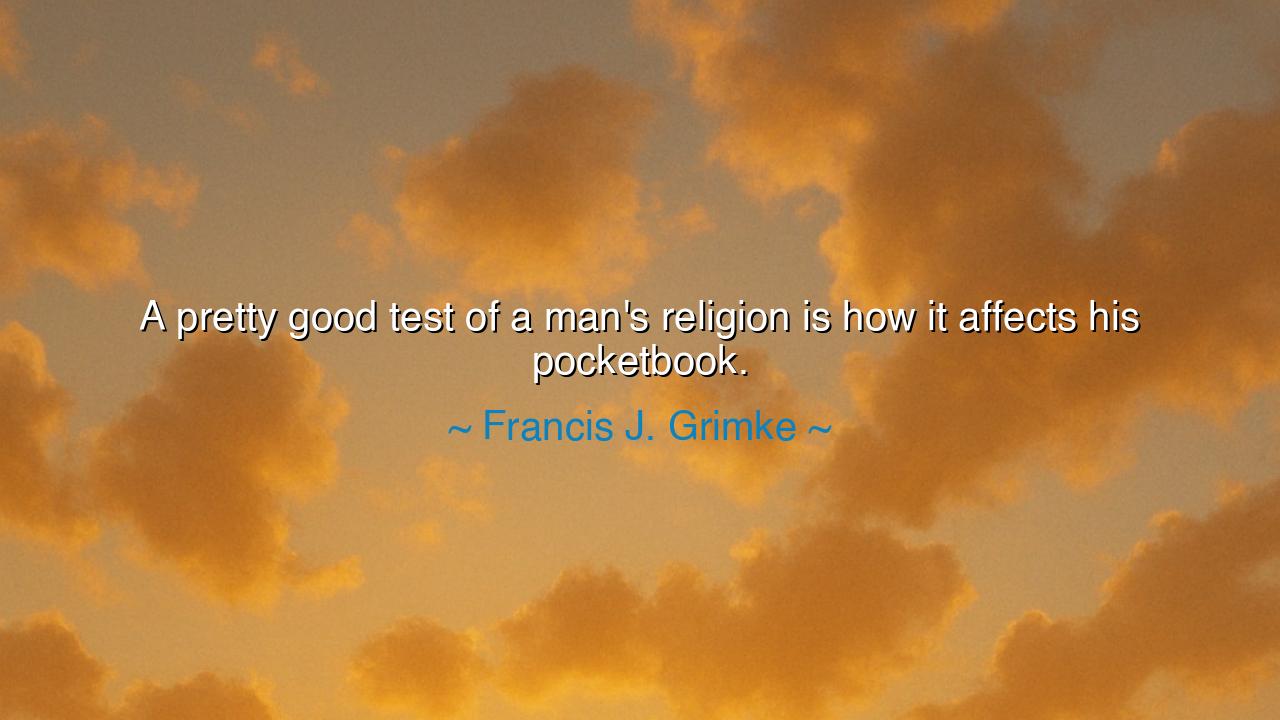
A pretty good test of a man's religion is how it affects his






"A pretty good test of a man's religion is how it affects his pocketbook." These words from Francis J. Grimke offer a powerful reflection on the nature of faith and its true implications in daily life. Grimke suggests that the true measure of a man's religion is not found in his words or rituals, but in the way it shapes his actions, especially in the realm of materialism. The pocketbook, symbolizing wealth and financial dealings, is not merely a tool for buying goods, but a reflection of a person’s values, priorities, and the extent to which their religion shapes their morality. It is easy to profess beliefs, but far more telling is how those beliefs affect the way one lives in the world, particularly in terms of how one engages with money, wealth, and society.
The origin of this truth can be traced back to the very essence of the ancient philosophical and religious traditions, which often held that material wealth was a reflection of inner virtue or vice. The Greeks and Romans, for instance, viewed wealth not as inherently evil, but as something that must be used wisely and ethically. Socrates, the great philosopher, argued that a person’s character was shown in their choices, and particularly in how they handled material wealth. The Stoics, too, emphasized that wealth and possessions should not be the goal of life, but rather the means to live virtuously. To them, the moral quality of a person could be measured by how they managed their material resources — whether they used their wealth to help others, or hoarded it selfishly.
This same principle is reflected in the teachings of Jesus. In the Gospel of Luke, Jesus speaks about the dangers of wealth, saying, "For where your treasure is, there your heart will be also." He calls on his followers not to place their trust in material possessions, but to seek the kingdom of God and store up treasures in heaven. Jesus understood that money could easily become an idol, something that shapes one’s actions and decisions in ways that contradict the values of true religion. Just as Grimke suggests, religion is not measured by theological doctrines, but by the way it influences how we live in relation to the world around us, especially when it comes to material wealth.
Consider the life of John Wesley, the founder of the Methodist movement, who held that religion should not only be concerned with the afterlife but should have practical implications in the present. Wesley famously declared that he would earn all he could, save all he could, and give all he could. He understood that money, when earned and used according to Christian principles, could serve as a tool for good in the world. His personal commitment to living modestly and giving generously was a direct outgrowth of his faith. For Wesley, the pocketbook was indeed a true test of faith, as it revealed whether one's religion was merely a set of beliefs or whether it was actively shaping how one lived, particularly in their relationship with others.
In more recent times, the story of Mahatma Gandhi serves as another profound example. Gandhi’s faith in Hinduism and his belief in truth and non-violence were demonstrated in the way he lived his life — particularly in his approach to money. He lived simply, wearing basic clothes made by hand, and rejected the materialism that had taken root in Indian society under British colonial rule. Gandhi’s understanding of spirituality was rooted in action, and his simple life, devoid of luxury and excess, reflected his deep belief that one’s material wealth should be used in service to others. His life, like that of Wesley, serves as a living testament to Grimke’s assertion: religion is not merely about professing beliefs, but about how those beliefs manifest in one’s daily choices — especially in how one handles wealth and resources.
Thus, Grimke’s words urge us to examine not just the words we speak or the prayers we say, but our actions — particularly in relation to money. It is easy to claim faith, but far more difficult to live it, especially when it comes to the challenges posed by the material world. The true test of religion, as Grimke wisely notes, lies in how it transforms our approach to the world’s temptations and our use of the resources at our disposal. Do we hoard wealth for ourselves, or do we use it to serve others? Do we place our trust in material possessions, or in the values and principles of our faith?
The lesson here is clear: examine how your faith impacts the choices you make in relation to money and material goods. Are you using your wealth for good, for service to others, or have you allowed materialism to control your actions? Grimke challenges us to align our spiritual beliefs with our actions, recognizing that how we live — particularly in relation to wealth — is the truest measure of our commitment to our faith. Live simply, as John Wesley and Gandhi did, and let your use of resources reflect your highest spiritual principles. In doing so, you will not only live authentically but will also help to create a world where justice, generosity, and compassion flow from the deepest values of your faith.






AAdministratorAdministrator
Welcome, honored guests. Please leave a comment, we will respond soon